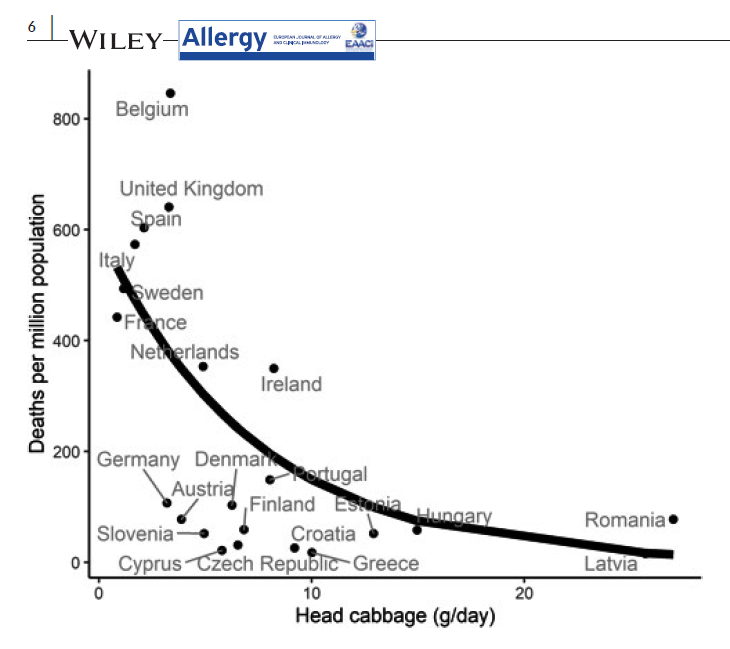Nutrition research basics: Association does not equal causation
I subscribe to a newsletter, Obesity and Energetics Offerings, that often includes a section on “Headline versus Study.” This demonstrates how headline writers jump actual findings and draw attention-getting conclusions that the studies don’t always support.
Here are four examples, all from the UK Biobank study, an enormous epidemiologic investigation of half a million participants who filled out a dietary questionnaire, and then were followed and tested to see what diseases they developed. These data enable investigators to link specific dietary factors to disease risk.
Such links are associations.
This kind of study is not designed to determine whether a dietary factor causes (or prevents) a disease. For that, other kinds of research are required.
These four examples examine associations of coffee intake with disease risk. That’s all they do.
The headlines, however, assume causation—an epidemiologic fallacy.
I. Headline: A Daily Dose of Coffee May Protect You from COVID-19.
Study: Self-Reported Dietary Behaviors and Incident COVID-19 in the UK Biobank.
Results: After multivariable adjustment, the odds (95% CI) of COVID-19 positivity was 0.90 (0.83, 0.96) when consuming 2–3 cups of coffee/day (vs. <1 cup/day), 0.88 (0.80, 0.98) when consuming vegetables in the third quartile of servings/day (vs. lowest quartile), 1.14 (1.01, 1.29) when consuming fourth quartile servings of processed meats (vs. lowest quartile), and 0.91 (0.85, 0.98) when having been breastfed (vs. not breastfed). Associations were attenuated when further adjusted for COVID-19 exposure, but patterns of associations remained.
Conclusions: In the UK Biobank, consumption of coffee, vegetables, and being breastfed as a baby were favorably associated with incident COVID-19; intake of processed meat was adversely associated.
Caveats: This study looked at associations of several dietary factors to Covid risk: breastfed as baby, and consumption of coffee, tea, oily fish, processed meat, red meat, fruit, and vegetables. Based on the results, the fallacious headlines could just as easily have read:
- Vegetables may protect you from COVID-19
- Being breastfed may protect you from COVID-19
- Processed meats may increase your risk of COVID-19
The operative word is “may.” This means that “may not” might also be appropriate.
Results: There were inverse linear associations between habitual coffee consumption and total brain (fully adjusted β per cup −1.42, 95% CI −1.89, −0.94), grey matter (β −0.91, 95% CI −1.20, −0.62), white matter (β −0.51, 95% CI −0.83, −0.19) and hippocampal volumes (β −0.01, 95% CI −0.02, −0.003), but no evidence to support an association with white matter hyperintensity (WMH) volume (β −0.01, 95% CI −0.07, 0.05). The association between coffee consumption and dementia was non-linear (Pnon-linearity= 0.0001), with evidence for higher odds for non-coffee and decaffeinated coffee drinkers and those drinking >6 cups/day, compared to light coffee drinkers. After full covariate adjustment, consumption of >6 cups/day was associated with 53% higher odds of dementia compared to consumption of 1–2 cups/day (fully adjusted OR 1.53, 95% CI 1.28, 1.83), with less evidence for an association with stroke (OR 1.17, 95% CI 1.00, 1.37, p = 0.055).
Conclusion: High coffee consumption was associated with smaller total brain volumes and increased odds of dementia.
Caveat: But why non-linear? If coffee had these effects, shouldn’t more of it should have more of an effect? Association, alas, does not equal causation.
3. Headline: Your Morning Cup of Coffee May Lower Your Risk of Liver Disease.
Results: Compared to non-coffee drinkers, coffee drinkers had lower adjusted HRs of CLD (HR 0.79, 95% CI 0.72–0.86), CLD or steatosis (HR 0.80, 95% CI 0.75–0.86), death from CLD (HR 0.51, 95% CI 0.39–0.67) and HCC (HR 0.80, 95% CI 0.54–1.19). The associations for decaffeinated, instant and ground coffee individually were similar to all types combined.
Conclusion: The finding that all types of coffee are protective against CLD is significant given the increasing incidence of CLD worldwide and the potential of coffee as an intervention to prevent CLD onset or progression.
Findings In this large, prospective, population-based community cohort study of more than 300 000 participants, each additional daily cup of coffee was associated with a 3% reduced risk of developing an arrhythmia; these associations were not significantly modified by genetic variants that affect caffeine metabolism.
Meaning Neither habitual coffee consumption nor genetically mediated differences in caffeine metabolism was associated with a heightened risk of cardiac arrhythmias.
Comment: Whether coffee drinking is good, bad, or indifferent to health has long been hotly debated. For a long time, studies seemed aimed at proving coffee bad for health. Now, studies seem aimed at showing the opposite. The UK Biobank is expensive; its funders are largely private foundations and government agencies. As far as I can tell, the coffee industry is not involved. My take on all of this? Take these epidemiological associations with a pinch of caffeine, and enjoy coffee if you like it.


